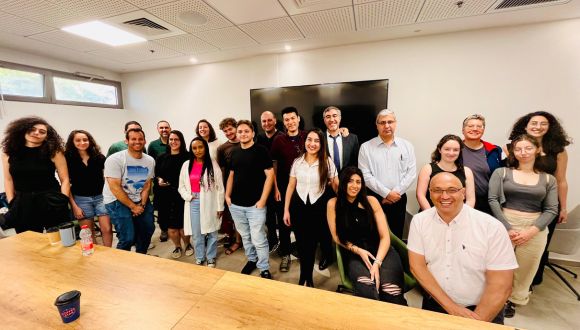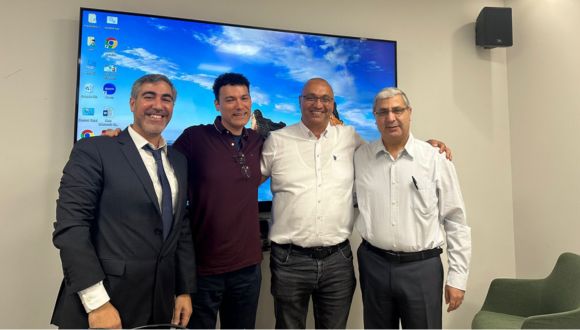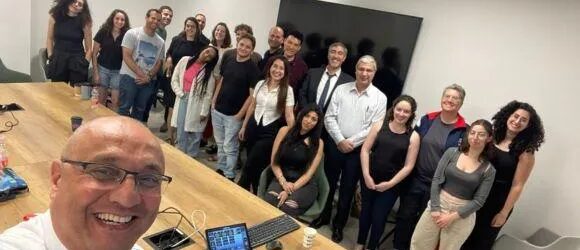Course brings Arab and Jewish students together to confront hard truths
In Israel, the word ‘dugri‘ is known to Jews and Arabs alike and means talking straight. Now, two Tel Aviv University (TAU) professors — one Arab, the other Jewish — have come together to offer a course called Dugri to help students grapple with the hard truths and trauma related to the Israeli-Palestinian crisis today.
“This is a war with many, many thousands of people getting killed and you can’t just ask students not to talk and express their feelings — that is the worst mistake,” says Youssef Masharawi, a professor from the Department of Physical Therapy who also chairs TAU’s Steering Committee for Arab Integration.
Masharawi teaches the Dugri course alongside Uriel Abulof, a professor from the Department of Political Science. Both Masharawi and Abulof have previously helped run courses related to the Palestinian-Israeli crisis, but this time they knew they would have to approach things differently and so they took dugri as their inspiration, including the “Let’s Talk Straight” video that went viral during the May 2021 violence.
“We’re not patching up the animosities, we’re not patching up the harsh realities,” says Abulof.
“It’s all about the sort of frankness and openness Jews and Arabs are capable of and turning that into a foundation for a respectful and substantial conversation.” — Prof. Abulof.
About the Dugri Course
Rather than teach a traditional course over several weeks, Abulof and Masharawi opted for an intensive approach where sessions would be run from 10:00 to 18:00, giving students more time for deeper conversation. The for-credit course takes place over three separate days across June and July, with periods for reflection and academic assignments between classes.

Masharawi (right) and Abulof (center) with the Dugri class.
There are approximately 20 students in the class — half Arab and half Jewish — and they come from diverse academic disciplines and from around the region, including the Gaza area.
To help facilitate the course, Masharawi and Abulof have put into place several house rules. For instance, students may reference anything said during the course at any time, but they must not name the person who said it — this mutual pact allows students to feel safer expressing their opinions and less afraid to say the wrong thing.
Other house rules include fairness, honesty and self-discipline, as well as mutual respect and listening. These priorities promote inclusion and allow for more critical thinking:
“Even if others don’t accept what a student is saying, they still have to stop and listen.” — Prof. Masharawi.
“There’s really a lot of effort to let people talk calmly and very honestly,” says Masharawi.
Three Intensive Days and Three Aspects of the Crisis
Each class is made up of several different sessions and organized around a unique theme pertaining to the crisis. For the first class on June 10, the theme was truth. Each student brought two news items with them: one they considered to be true and another they considered to be disinformation. Students also had to write up an academic rationale for each choice.

Abulof and Masharawi (center) were joined on the first day of the Dugri course by two special guests: Adv. Reda Jaber, director of the Aman Center (right) and Rabbi Moshe Turgman (left).
The course furthermore began with a facilitated session where each student stood face-to-face and answered icebreaker questions with one another in a rotating line. “The face-to-face encounter, this is so hugely important,” says Abulof.
“I think throughout the day, we were able to sort of re-enact a more intellectual and emotional face-to-face encounter. We all at least tried to see the other person and be in line with dugri.” — Prof. Abulof.
The second and third classes will be dedicated to the themes of trust and art, respectfully. “So much of the trust has gone away. You can’t sit in the same class, Arab and Jew, and not trust each other … trust needs to be the basis,” says Masharawi.
The Hope Behind Dugri
For both Masharawi and Abulof, there’s never been a more critical time to be holding this course. “There are good reasons to be truly worried,” reflects Abulof.
“But it is precisely in those moments that are the hardest, when the animosity is so high … if in those moments you can actually manage to see the individual human being before you, well that is a remarkable feat.” — Prof Abulof.
When it comes to this task, both emphasize that academia bears a responsibility in bringing about change.
“If, as a university, we aren’t able to discuss things here, then no other platform will be able to do this.” — Prof. Masharawi.
“This is the platform, and this is the place where this should be happening,” says Masharawi.
At the same time, offering Dugri as a pilot course this year is only the beginning. “It’s a fateful time for us, and Tel Aviv University and other Israeli universities have a responsibility to cultivate much more of this sort of dialogue. I think we should exit the ivory tower as soon as we possibly can and really go into the community centers, the synagogues, the mosques and even the barber shops,” says Abulof.
Masharawi also envisions offering the course globally: “There’s a lot of hatred everywhere, because people no longer listen to each other,” he says.
“I would love to work together with universities around the world and do an international course where we let people talk and seek answers without all the fear.” — Prof. Masharawi.
